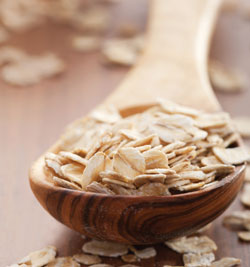All about oats
This article was originally published in January 2011

Beat January’s chill with a piping-hot bowl of oatmeal — a breakfast that endures. Heart-healthy oats are a powerful source of dietary fiber and essential minerals manganese and selenium, which help the body utilize other key nutrients and ward off disease. Oatmeal originated hundreds of years ago in Scotland, where oatmeal is used in everything from hot breakfasts and baked treats to stuffing, gratins, sweet and savory puddings and as a breading for meat, poultry and fish. Oats are hulled before they are refined into the following varieties; the least refined options offer the greatest benefit as most nutrients are stored in the bran.
Oat bran — The fibrous outer layers of oats; a good source of dietary soluble fiber.
Oat groats — Whole oats with only the outer husk removed.
Rolled oats — Made by pressing whole oats between two rollers. (Choose from thin, regular or thick.)
Quick-cooking oats — Cut more finely and rolled thinner than regular or thick-rolled oats.
Steel-cut oats — Whole groats, thinly sliced, which take longer to cook and offer a chewy texture.
Stone-ground oats — Scottish-style oats for porridge, made by slowly grinding the kernel between two large mill stones.
Instant oatmeal — Produced by partially cooking the grains and then rolling them very thin. Sugar, salt and other ingredients often are added to make the finished product.
